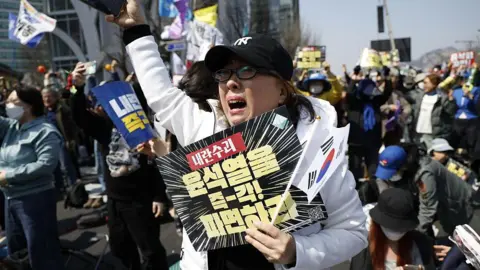In 2025, the political landscape in South Korea was stirred by the dramatic impeachment of former President Yoon Suk Yeol. This moment was significantly shaped by the voices and actions of women, particularly young women, who initiated mass protests against his administration’s perceived injustices and anti-feminist policies. Yet, as the country gears up for a presidential election on June 3, many of these same women now express feelings of being invisible and overlooked as the candidates grapple with gender politics.
The backdrop to this political turmoil was a shocking incident on December 3, 2024, when President Yoon declared martial law, a decision met with widespread disbelief and outrage. Byunghui, a college student from Daegu, found herself joining thousands of others traveling to the nation’s capital, Seoul. She participated in protests that became a clarion call against the administration’s failure to address ongoing sexism and gender discrimination in South Korea, a nation with a notorious history of entrapping women in societal and political discrimination.
During the ongoing protests throughout the winter months, a palpable sense of solidarity emerged among protestors. The demonstrations were not merely about politics; they were about reclaiming dignity and representation in a patriarchal society. The stark contrast between the women’s calls for equality and the dismissive responses from male political figures became evident. Yoon’s rhetoric that South Korea had no sexism only deepened the frustrations of protestors like Byunghui, who felt that their voices were relegated to the margins in the dialogue.
However, as the election approaches, the focus of political candidates shifts, largely neglecting the issues significant to the women who contributed to the ousting of Yoon. The leading candidates have skirted discussions about gender equality, with one candidate, Lee Jae-myung, even controversially asserting that it is inappropriate to divide Koreans along gender lines. This approach left many young women feeling disenfranchised and questioning the progress they had fought for, with one protestor remarking, “I feel like they’re trying to erase our voices.”
In previous protests, especially those featuring K-pop music that resonated with younger generations, women’s participation surged. Various studies indicated that a significant portion of the protestors were indeed young women, with research from Chosun Daily reporting that one in three attendees during a notable rally were in their 20s or 30s. Their emotional investment in these protests transcended mere political action; it was a reclamation of agency in a landscape that long disregarded them.
Despite Yoon’s administration being replaced, the political scene seems to be reverting to a familiar exclusion. The presence of an all-male candidate roster in the upcoming elections is alarming for many, especially given that just two elections ago, women were included among candidates. The lack of female representation is a point of disappointment highlighted by participants like Lee Jinha, who feels the absence of inclusive policies targeting women undermines the very essence of their previous efforts.
Moreover, the new electoral landscape is beset with opposition not only from established political parties but also emerging candidates like Lee Jun-seok, who emboldens an anti-feminist sentiment among certain male demographics. His controversial comments regarding misogyny highlight a growing trend of backlash against feminist movements, further complicating the dialogue around gender equality in South Korea.
The ongoing discussions around family policies and socioeconomic hurdles faced by women add to the complexity. Politicians primarily focus on increasing birth rates, neglecting the fundamental issues regarding workplace inequality and overarching societal pressures that hinder women’s progress. Even as the Ministry of Gender Equality and Family is promoted as a framework for advocacy, concerns linger regarding how seriously the commitment to feminism will be upheld under new leadership.
As the election inches closer, women like Saeyeon and Kim Saeyeon stand at a pivotal moment, grappling with disillusionment as they witness their representation and voices seeming to wane. They have fervently engaged in political protests to elevate their concerns, advocating for a world where voices of all genders are not just heard but respected.
In conclusion, the resurgence of democratic engagement among young women in South Korea during the impeachment of Yoon Suk Yeol marked a significant moment in the country’s political history. Yet as electoral pressures shift, the endurance of these efforts hangs precariously. The underlying tensions between gender politics and electoral strategies underscore a need for sustained advocacy, ensuring that the voices of those who wielded power during periods of crisis remain prominent in future discourses. This battle for recognition and representation will be crucial as South Korea’s political landscape continues to evolve in the face of changing social dynamics.



